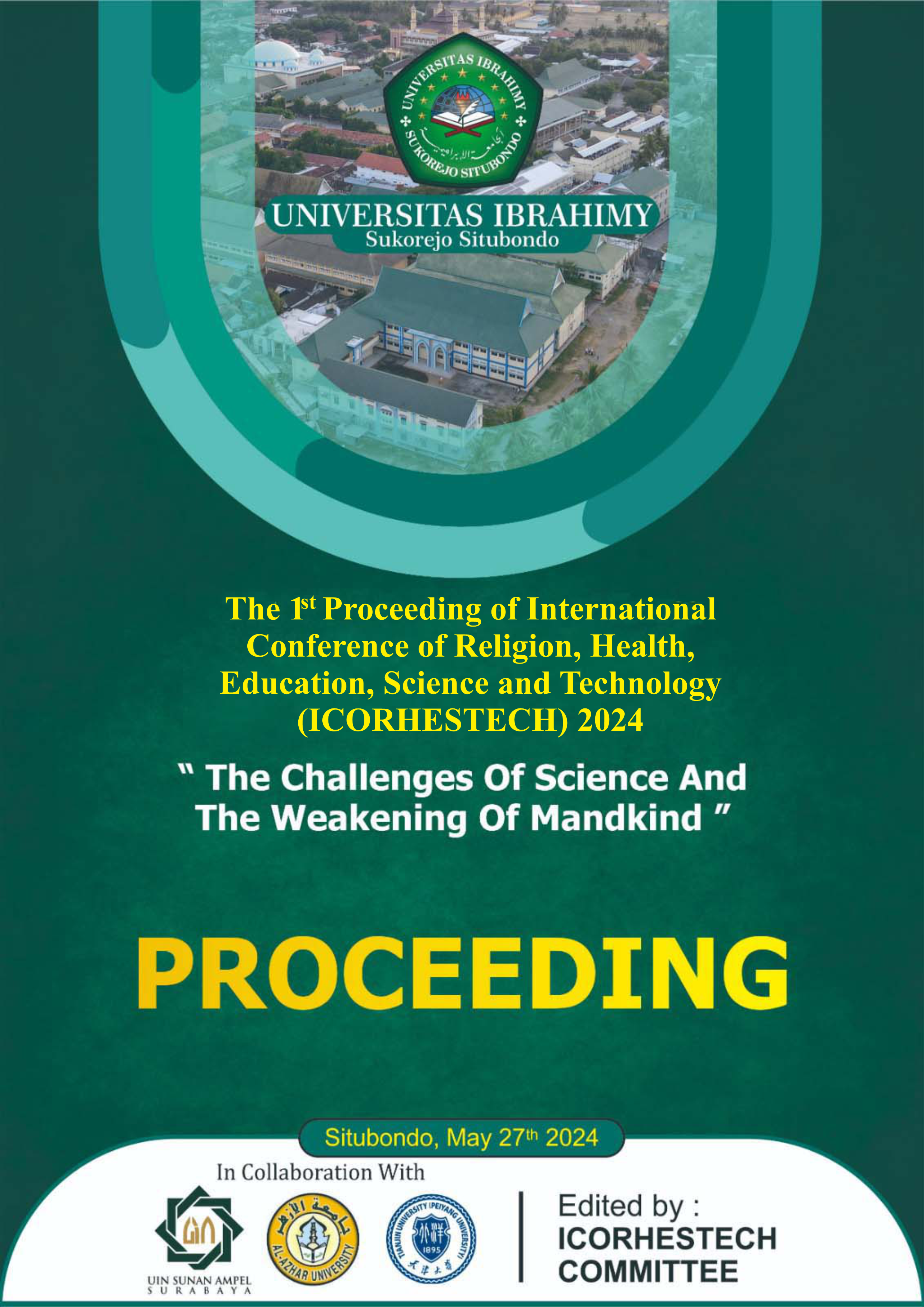Sustainable Environmental Management Based On Local Wisdom Of The Mbojo Bima Tribe, NTB
DOI:
https://doi.org/10.35316/icorhestech.v1i1.5687Abstract
The issue of environmental damage is currently increasingly worrying, starting from landslides, floods, piles of rubbish, agricultural activities, illegal logging, waste disposal, pollution, air, erosion, gas and water supplies which continue to be a real threat to human life. Meanwhile, the environmental damage index in Bima is at the highest position compared to other regions. This condition can be seen from the problems of forest destruction, pollution, waste disposal, and declining soil quality, causing floods and landslides in various sub-districts in the Bima NTB region, such as the Bima flash flood in 2016, floods in 9 (nine) Bima Regency sub-districts 2018-2023.Research purposes, want to know, the forms of environmental damage in Bima NTB, Also Want to know about sustainable environmental management based on local wisdom of the Mbojo Bima tribe, NTB.Research methodsin the form of empirical legal research with a sociological approach, case approach, conceptual approach and philosophical approach. Data sources include primary data and secondary data. Heuristic and interpretative analysis.Findings shows that (1) Forms of Environmental Damage in Bima, covers illegal logging, agricultural activities, use of herbicides and pesticides, irregular disposal of B3 waste, piles of rubbish everywhere, use of greenhouses, gas and dust pollution in various sub-districts. (2) Sustainable Environmental Management Based on the Local Wisdom of the Mbojo Bima Tribe, there is a balance between the values of the local wisdom of the Bima people and nature and the surrounding environment, where cultural beliefs about "parafu (sacred places that reside in springs and trees) and the concept of "ngaha aina ngoho” (managing forests and the environment well and sustainably) is the main basis for environmental management in the Bima NTB region.
References
Afrizal, Markum, B. S. (2024). Pemanfaatan Sumber Daya Hutan di Kawasan Hutan Kemasyarakatan Oi Rida Desa Maria Utara Kecamatan Wawo Kabupaten Bima. Jurnal Penelitian Kehutanan, 18(1), 34–51.
Ang, C. K., Embi, M. A., & Yunus, M. M. (2016). Enhancing the Quality of the Findings of a Longitudinal Case Study: Reviewing Trustworthiness via ATLAS.ti. The Qualitative Report, 21(10). Retrieved from https://nsuworks.nova.edu/tqr/vol21/iss10/7
Arslan, Z., Can, Ş., & Wilson, T. M. (2020). Do border walls work?: security, insecurity and everyday economy in the Turkish-Syrian borderlands. Turkish Studies. https://doi.org/10.1080/14683849.2020.1841642
Bachtiar. (2018). Metode Penelitian Hukum. Tangerang Selata : UNPAM PRESS.
Banjaran Aji, S. (2019). Moratorium Sawit Jokowi dalam Perspektif Kebijakan Pembangunan Berkelanjutan ala Politik Hijau. Jurnal Hukum Lingkungan Indonesia, 5(2), 186–207.
Barral, V. (2012). Sustainable development in international law: Nature and operation of an evolutive legal norm. European Journal of International Law, 23(2), 377–400. https://doi.org/10.1093/ejil/chs016
Bovensiepen, J. M. (2015). The Land of Gold: Post-Conflict Recovery and Cultural Revival in Independent Timor Leste. SEAP.
Creswell, J. W., & Creswell, J. D. (2018). Research Design: Qualitative, Quantitative, and Mixed Methods Approaches (5th ed.). London: Sage.
Creswell, J. W., & Poth, C. N. (2018). Qualitative Inquiry and Research Design Choosing Among Five Approaches (4th ed.). Thousand Oaks, CA: Sage.
Cummins, D. (2018). Local Governance in Timor-Leste: Lessons in postcolonial state-building. London: Routledge.
Dhaifulloh, A. D., Khayumi, B. I., & Tirtayuda, D. (2024). Dampak Penggunaan Pestisida Kimia Terhadap Kualitas Tanah dan Air Sungai di Daerah Pertanian. Jurnal Publikasi Rumpun Ilmu Teknik, 2(2).
Dimyati, K., & Kelik Wardiono, Ridwan, S. R. (2015). Pemikiran Transendental Model Profetik. Hukum Ransendental Pengembangan Dan Penegakan Hukum Di Indonesia, 2(20), 71–85.
Dkan. (2022). Portal Satu Data NTB : Sistem Data Terbuka yang menyediakan data resmi Pembangunan Provinsi Nusa Tenggara Barat yang dihimpun dari berbagai Organisasi Perangkat daerah dan Pemangku Kepentingan lainya. Data.Ntbprov. https://data.ntbprov.go.id/publikasi
Dzawanda, B., Nicolau, M. D., Matsa, M., & Kusena, W. (2021). Livelihood Outcomes of Informal Cross Border Traders Prior to the Rise of the Virtual Cash Economy in Gweru, Zimbabwe. Journal of Borderlands Studies. https://doi.org/10.1080/08865655.2020.1865187
Elsing, S. (2019). Navigating Small-Scale Trade Across Thai-Lao Border Checkpoints: Legitimacy, Social Relations and Money. Journal of Contemporary Asia, 49(2), 216–232. https://doi.org/10.1080/00472336.2018.1551559
Ghosh, S. (2019). Chor, Police and Cattle: The Political Economies of Bovine Value in the India–Bangladesh Borderlands. South Asia: Journal of South Asia Studies, 42(6), 1108–1124. https://doi.org/10.1080/00856401.2019.1672926
Greig, A., & Turner, M. (2024). Policy and hope: The millennium development goals. Global Policy, 15(1), 66–77. https://doi.org/10.1111/1758-5899.13296
Grillot, C. (2016). “Trust facilitates business, but may also ruin it”: the hazardous facets of Sino-Vietnamese border trade. Asian Anthropology, 15(2), 169–185. https://doi.org/10.1080/1683478X.2016.1216281
Hale, G. (2019). Borders Near and Far: The Economic, Geographic and Regulatory Contexts for Trade and Border-Related Issues in Landlocked Alberta. Journal of Borderlands Studies, 34(2), 157–180. https://doi.org/10.1080/08865655.2017.1315609
Henrietta L. Moore. (2015). Global Prosperity and Sustainable Development Goals. Journal of International Development, 27(6), 801–815.
Iqbal, S. (2023). Bale Lumbung Padi Sebagai Role Model Ketahanan Pangan Masyarakat Nusa Tenggara Barat. Eastasouth Journal of Impactive Community Services, 2(01), 1–12. https://doi.org/10.58812/ejimcs.v2i01.27
Light, A. (2002). Contemporary Environmental Ethics From Metaethiscs To Public Philosophy. Metaphilosophy, 33(4), 0026–1068.
Mbojoklopedia. (2022). Artifisial Parafu Hingga Hikayat Sang Bima. Mbojoklopedia.Com. http://www.mbojoklopedia.com/2020/08/artifisial-parafu-hingga-hikayat-sang.html
Nukman, H. (2018). Inspiratif! Suku Mbojo di Bima Punya Tradisi Lestarikan Sumber Air. Travel.Detik.Com. https://travel.detik.com/domestic-destination/d-4218866/inspiratif-suku-mbojo-di-bima-punya-tradisi-lestarikan-sumber-air
Quinton, J. N., & Fiener, P. (2024). Soil erosion on arable land: An unresolved global environmental threat. Progress in Physical Geography, 48(1), 136–161. https://doi.org/10.1177/03091333231216595
Sahoo, S. K., & Goswami, S. S. (2024). Theoretical framework for assessing the economic and environmental impact of water pollution: A detailed study on sustainable development of India. Journal of Future Sustainability, 4(1), 23–34. https://doi.org/10.5267/j.jfs.2024.1.003
Samuel, B. Graves, Sandra A. Waddock, B. C. (1994). Institutional Owners and Corporate Social Performance. Academy of Management Journal, 37(4), 1034–1046. https://doi.org/10.2307/256611
Taher, Y. A. (2021). Dampak Pupuk Organik dan Anorganik terhadap Perubahan Sifat Kimia Tanah dan Produksi Tanaman Padi. Jurnal Menara Ilmu, 15(2), 67–76.
Tati Haryati, A. G. H. (2024). Integrasi Nilai Kearifan Local Ngaha Aina Ngoho Dalam Program Penguatan Mitigasi Tanggap Darurat Bencana Pada Satuan Pendidikan Di Kabupaten Bima. Jurnal Trapung. Ilmu Sosial, 6(1), 100–109.
Wignjosoebroto, S. (2009). Metode Penelitian Konstalasi dan Refleksi. Jakarta : Yayasan Obor Indonesia.
Downloads
Published
How to Cite
Issue
Section
License








